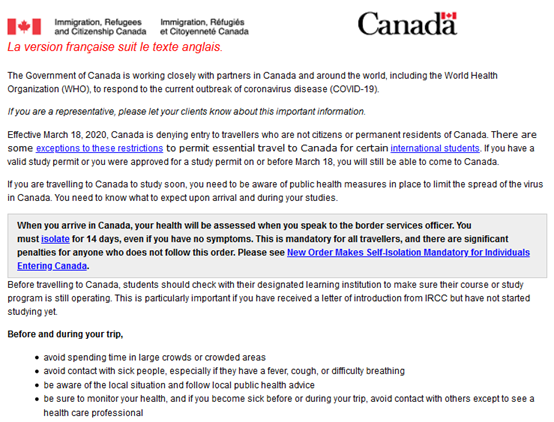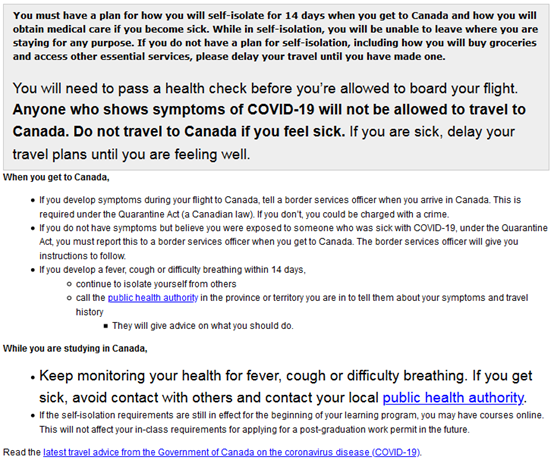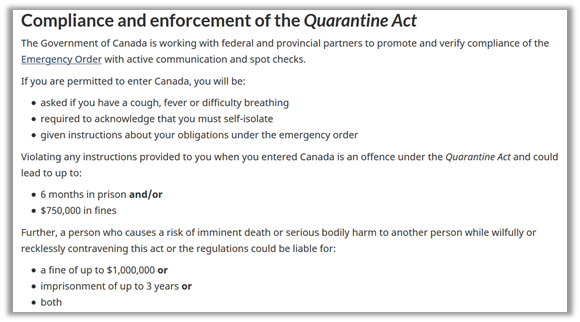Scan


If you are travelling to Canada to study soon, you need to be aware of public health measures in place to limit the spread of the virus in Canada. You need to know what to expect upon arrival and during your studies.
When you arrive in Canada, your health will be assessed when you speak to the border services officer. You must isolate for 14 days, even if you have no symptoms. This is mandatory for all travellers, and there are significant penalties for anyone who does not follow this order. Please see New Order Makes Self-Isolation Mandatory for Individuals Entering Canada.
Before travelling to Canada, students should check with their designated learning institution to make sure their course or study program is still operating. This is particularly important if you have received a letter of introduction from IRCC but have not started studying yet.
Before and during your trip,
avoid spending time in large crowds or crowded areas
avoid contact with sick people, especially if they have a fever, cough, or difficulty breathing
be aware of the local situation and follow local public health advice
be sure to monitor your health, and if you become sick before or during your trip, avoid contact with others except to see a health care professional
You
must have a plan for how you will self-isolate for 14 days when you get
to Canada and how you will obtain medical care if you become sick.
While in self-isolation, you will be unable to leave where you are
staying for any purpose. If you do not have a plan for self-isolation,
including how you will buy groceries and access other essential
services, please delay your travel until you have made one.
You will need to pass a health check before you’re allowed to board your flight. Anyone who shows symptoms of COVID-19 will not be allowed to travel to Canada. Do not travel to Canada if you feel sick. If you are sick, delay your travel plans until you are feeling well.
When you get to Canada,
If you develop symptoms during your flight to Canada, tell a border services officer when you arrive in Canada. This is required under the Quarantine Act (a Canadian law). If you don’t, you could be charged with a crime.
If you do not have symptoms but believe you were exposed to someone who was sick with COVID-19, under the Quarantine Act, you must report this to a border services officer when you get to Canada. The border services officer will give you instructions to follow.
If you develop a fever, cough or difficulty breathing within 14 days,
They will give advice on what you should do.
continue to isolate yourself from others
call the public health authority in the province or territory you are in to tell them about your symptoms and travel history
While you are studying in Canada,
Keep monitoring your health for fever, cough or difficulty breathing. If you get sick, avoid contact with others and contact your local public health authority.
If the self-isolation requirements are still in effect for the beginning of your learning program, you may have courses online. This will not affect your in-class requirements for applying for a post-graduation work permit in the future.


The Government of Canada is working with federal and provincial partners to promote and verify compliance of the emergency order with active communication and spot checks.
If you are permitted to enter Canada, you will be:
asked if you have a cough, fever or difficulty breathing
required to acknowledge that you must self-isolate
given instructions about your obligations under the emergency order
Violating any instructions provided to you when you entered Canada is an offence under the Quarantine Act and could lead to up to:
6 months in prison and/or
$750,000 in fines
Further, a person who causes a risk of imminent death or serious bodily harm to another person while wilfully or recklessly contravening this act or the regulations could be liable for:
a fine of up to $1,000,000 or
imprisonment of up to 3 years or
both

related official web link: https://www.canada.ca/en/public-health/services/diseases/2019-novel-coronavirus-infection/latest-travel-health-advice.html#f